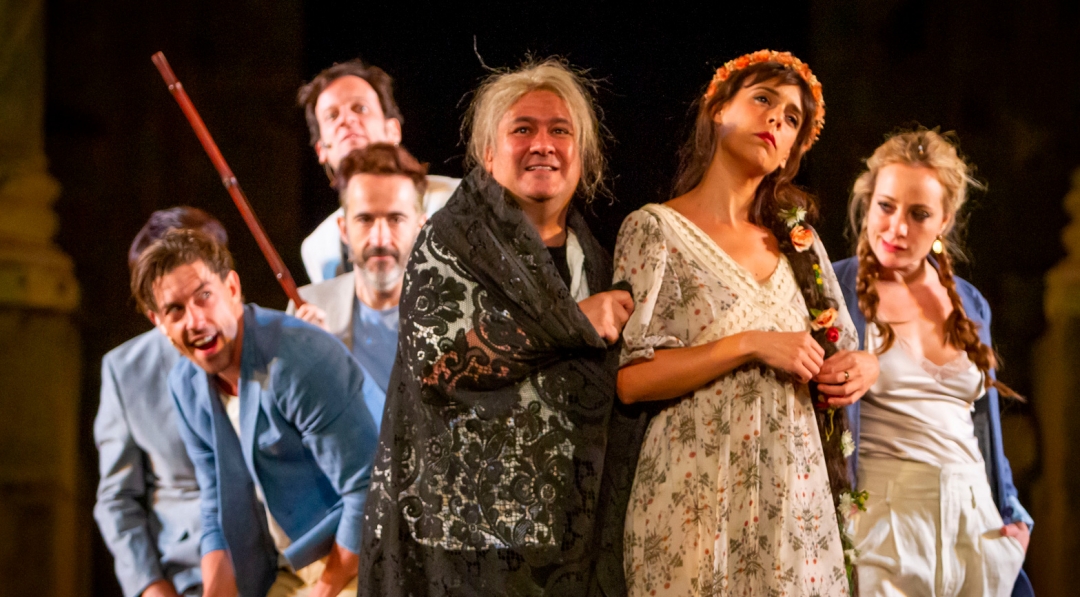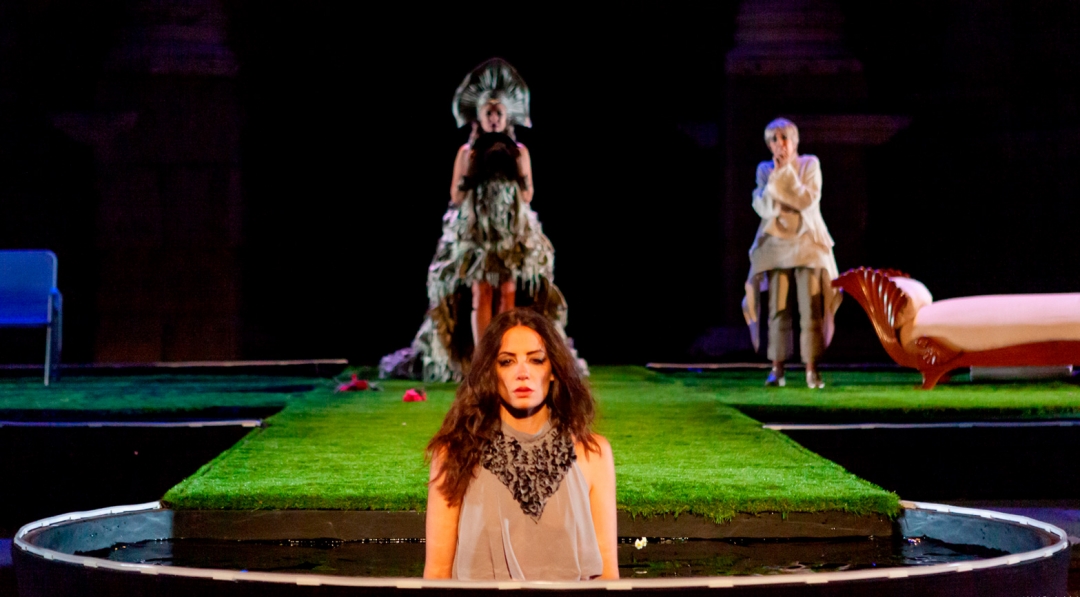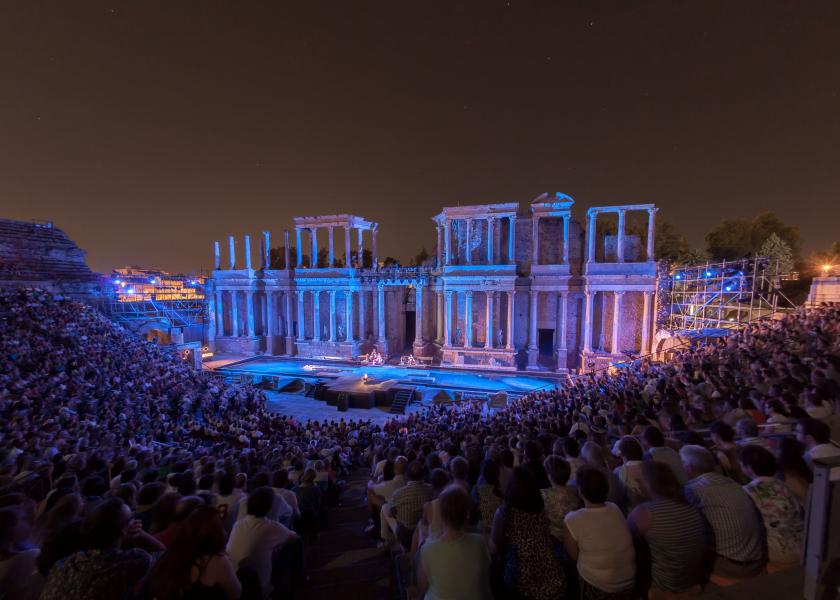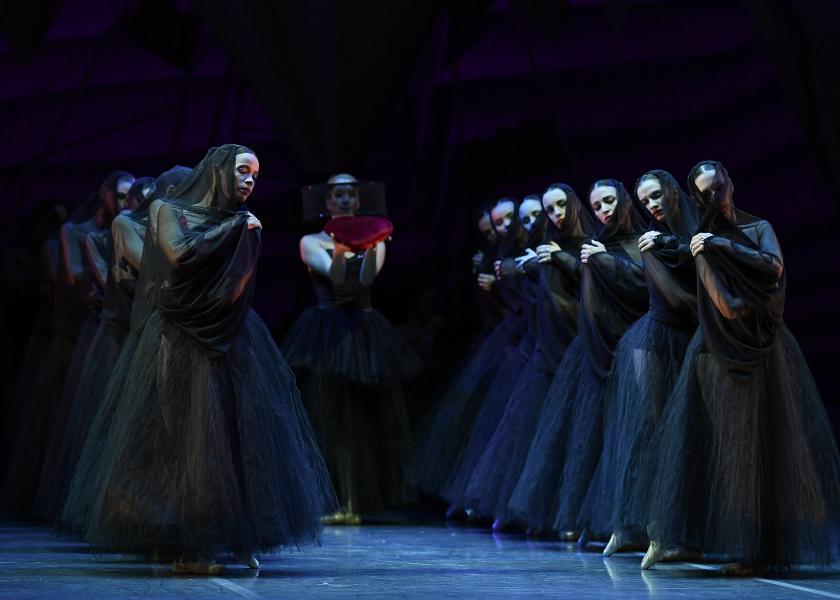‘Metamorphoses’
Ovid’s Triumph In Mérida

A dream cast, a versatile director—David Serrano—with experience in musical theatre and cinema, and an adaptation by award-winning author Mary Zimmerman are the ingredients of the success of what is possibly the most relevant premiere of this year’s Mérida International Classical Theatre Festival.
The public has not let the festival down: for the first time in almost twenty years, pre-sale tickets were practically sold out, and the organisation decided to schedule an extra date for Metamorphoses. Because Ovid’s work has always been prestigious and has influenced many medieval and baroque authors. The adaptation represented in Mérida, by American author Mary Zimmerman, was awarded several Tony awards in 2002.
The concept of change is the central axis of a work that is structured in ten pieces halfway between the epic and the didactic, with an exceptional narrator: Concha Velasco. The actress returns to the International Classical Theatre Festival for the third time—after Hélade and Hecuba—with a complex text, which plays with the genres, and a choral cast. The artist from Valladolid is accompanied by another regular of the Roman Theatre of Mérida, Pepe Viyuela, and a group of actors known to the general public for their roles in theatre, television and cinema, such as Belén Cuesta (Paquita Salas; Kiki, el amor se hace; La llamada), Adrián Lastra (Billy Elliot, Toc Toc), Edu Soto (Cabaret, B&B), Ángela Cremonte (Los universos paralelos, Las chicas del cable), Pilar Castro (Julieta, Gordos), Secun de la Rosa (Días de fútbol, Hamlet), Pepe Leisure (Smoking Room, Alta mar), and María Hervás (Iphigenia en Vallecas, Arde Madrid).
David Serrano is well versed in choral casts. As a writer, one of his first scripts was a success: El otro lado de la cama. Shortly afterwards, he directed the feature Días de fútbol, but his true home is the theatre, where he has directed and written pieces like Billy Elliot, Los universos paralelos, and Hoy no me puedo levantar, among others. His decision to do Ovid’s Metamorphoses for the Mérida International Classic Theatre Festival was a risky one due to the complexity of the original text, an oneiric narrative using myths to describe the history of the world, from its creation up to the moment when Julius Caesar’s soul becomes a star.
'Metamorphoses' shows human emotions like love, greed, and desire with a sense of humour and affection
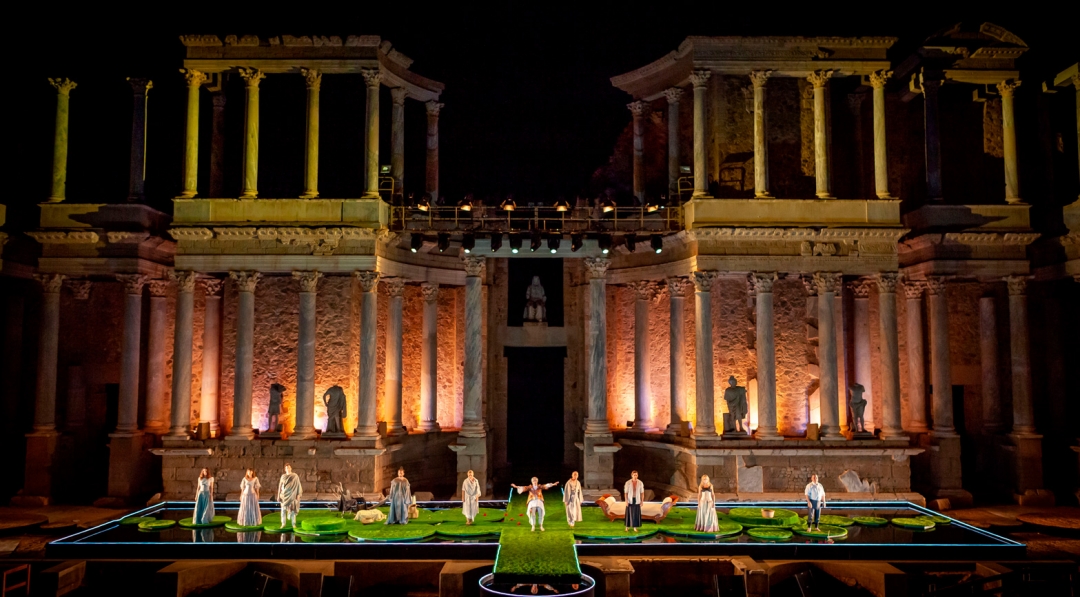
The ten actors that make up the choral cast of 'Metamorphoses', in the Roman theatre of Mérida. © Jero Morales - Festival Internacional de Teatro Clásico de Mérida
Serrano’s vision has a clear basis: ten actors for an adaptation in ten pieces that are almost plays in themselves, with a string of characters. “Every actor’s dream,” as Belén Cuesta said: the opportunity to play several roles—up to seven or eight—with very different tones. Ovid’s Metamorphoses are stories with a sharply exemplary and didactic character, the narrative of which introduces the spectator to gods, nymphs, heroes and wars.
Metamorphoses shows human emotions like love, greed, and desire with a sense of humour and affection. They all roll by in a production that leaves the spectator hardly time to breathe, and in which the myths revolve around an element, water, which provides the changes that give the work its title. In Metamorphoses, the central pool of the stage plays, like the actors, different roles, in keeping with its changing character. It is King Midas’ pool, Narcissus’ mirror, the River Styx.
The richness of the adaptation is completed with a surprising mise-en-scène. The Mérida theatre is already challenging in itself, and the complexity of the succession of myths and stories of Metamorphoses makes the work of those responsible for lighting, Juan Gómez Cornejo, and set design, Mónica Boromello, even more remarkable when it comes to highlighting the spectacular costumes, by Yaiza Pinillos, which combine contemporaneity and simplicity. The original music by Luis Miguel Cobos would deserve an article itself.
Zeus, Eurydice and Orpheus, Psyche, Bacchus, Aphrodite, Apollo, Phaeton... Gods and humans roll by in the play and show inherently human feelings and weaknesses with a tone that captivates immediately and makes it easy for the viewer to identify with the characters.
David Serrano’s Metamorphoses will be performed until August 11, but Mérida is the only place where you can experience this whirlwind story of gods, myths, heroes and fallible humans. Due to the cast—“the dream team,” as the director says—having such full agenda’s, the play starts and finishes its tour at the Roman theatre.
“Those who love the gods are gods themselves,” recites Concha Velasco at the end of her performance. She has also announced that this is her farewell to the festival. And there are no tickets left.
